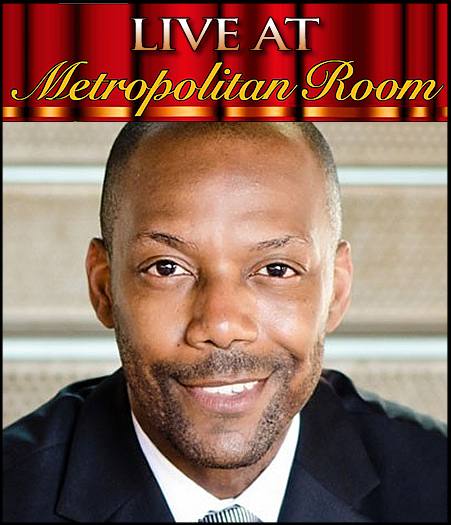NY Cabaret Review by Marilyn Lester
Broadway triple-threat, T. Oliver Reid’s club-hopping show, “Drop Me Off In Harlem,” has already won a Bistro Award, and if it follows Reid’s own career trajectory – who knows what will happen next. “Drop Me Off In Harlem” has evolved since its debut a few years ago, and like, Reid, just keeps getting better and better.
The show is a well-paced, captivating musical tour of Harlem 1934, from the ritziest of clubs: Minton’s, Small’s Paradise and the fabled Cotton Club, to down and dirty speakeasies and basement venues, such as the 21 Club – places Reid says, were like a crowded subway car in August – without air conditioning. “Drop Me Off In Harlem,” is smartly thought out; the ratio of patter to music is well-considered, and the song list mirrors a perfect journey through a world that was just about to change radically: 1934 was a swan song for the Jazz Age in Harlem. Race riots in 1935 made Harlem an off-limits territory to the whites who flocked north to hear some of the best music in town. The Cotton Club, for instance, closed its doors and moved to midtown Manhattan, where the jazz scene became concentrated on and around West 52nd St.
But for tonight, we’re at the peak of the game, with Duke Ellington’s Echoes of Harlem to lead the way. Resplendent in top hat and tux, Reid let us know What Harlem Is To Me, by Harlem’s own Andy Razaf: poet, composer and lyricist, whose name isn’t nearly as well known as it should be. If you’re not lucky enough to live in Harlem, how do you get there? You follow the directions Duke Ellington gave to the young Billy Strayhorn and you Take The A Train, of course.
The Ellington-Strayhorn “A Train” has become iconic and Reid’s mini-band played a full out swing arrangement that would have made “Strays” and Duke proud. With Music Director and pianist Lawrence Yurman on the job, backed by Damien Bassman on drums, Ray Kilday on bass, and Trevor Neumann on trumpet, Reid delivered an energetic rendition of the tune. Adding a trumpet to the standard rhythm section provides the perfect texture to the show’s songbook. Backed by piano and trumpet, for example, Ellington’s In A Sentimental Mood (a tune most notably associated with a saxophone) was put across with a sublime subtlety not usually connected with brass.
Which brings us to another Ellington standard: Sophisticated Lady and why T. Oliver Reid is truly a consummate performer. Reid has the rare ability to completely inhabit a song. Frank Sinatra, Mabel Mercer, Ella Fitzgerald move over. When Reid sings Sophisticated Lady it’s not about the woman in question, it is to her; it’s the best rendition of the tune we’ve ever heard, bar none.
Lest you think Duke Ellington dominates Reid’s selection of songs, there were plenty by that other prolific songwriters of the day, Harold Arlen, such as Happy as The Day Is Long, Primitive Prima Donna, As Long As I Live, and Satan’s Little Lamb. Arlen’s Ill Wind, It’s Only A Paper Moon, and I’ve Got The World On A String were sung as a suite, modulated from the intensely serious to the full-out happy. This trio of songs followed the “Blue Mini Suite,” a set of tunes that Reid performed suggesting a minstrel show. The intersection of race and jazz music is part of the cultural history of our nation – Harlem in the 1920s and 1930s being a microcosm of forces affecting a greater whole. Reid hits racial issues head on and cleanly with Ellington’s Mood Indigo blended with Harry Akst-Grant Clarke’s Am I Blue, followed by Andy Razaf-Fats Waller’s achingly poignant Black and Blue, and ending with Arlen’s I Got A Right To Sing The Blues.
On a lighter note, Cab Calloway’s Minnie the Moocher, Wesley Wilson’s Gimme A Pig Foot, and Andy Razaf’s “naughty” If I Can’t Sell It, made famous by the irrepressible Ruth Brown, provided levity and fun on the musical tour.
Saturday night in Harlem should also end with a nod to Sunday morning church, and so piano and bass perfectly and sensitively backed Ellington’s Come Sunday, which Reid sang soulfully as Duke meant it to be – a prayer. Then ending all too soon, Ellington’s up-tempo Ring Dem Bells signaled time to go. A final adieu was bid with a clever lyric tweak to I. Caesar-J.Meyer-R.W. Kahn’s Crazy Rhythm.
T. Oliver Reid has enormous style. He also has an impressive vocal range, and an innate theatricality that makes for a highly entertaining evening. Since launching a cabaret career in 2010 (and winning a slew of awards from the get-go) Reid has also added directing to his arsenal of talents. Although he modestly gives credit to his sidemen for helping shape the show, T. Oliver Reid’s ability to know what’s right for his own performance just adds to this artist’s amazing abilities. Reid sure knows how to bring joy and a top hat full of happy to a delighted and utterly gratified audience. Aint-Cha-Glad? We sure are!
“Drop Me Off In Harlem” with T. Oliver Reid. October 19 and 26, and November 2 at 7 pm. November 9 at 9:30 pm. The Metropolitan Room, 34 West 22nd St., 212-20-0440, www.metropolitanroom.com



















